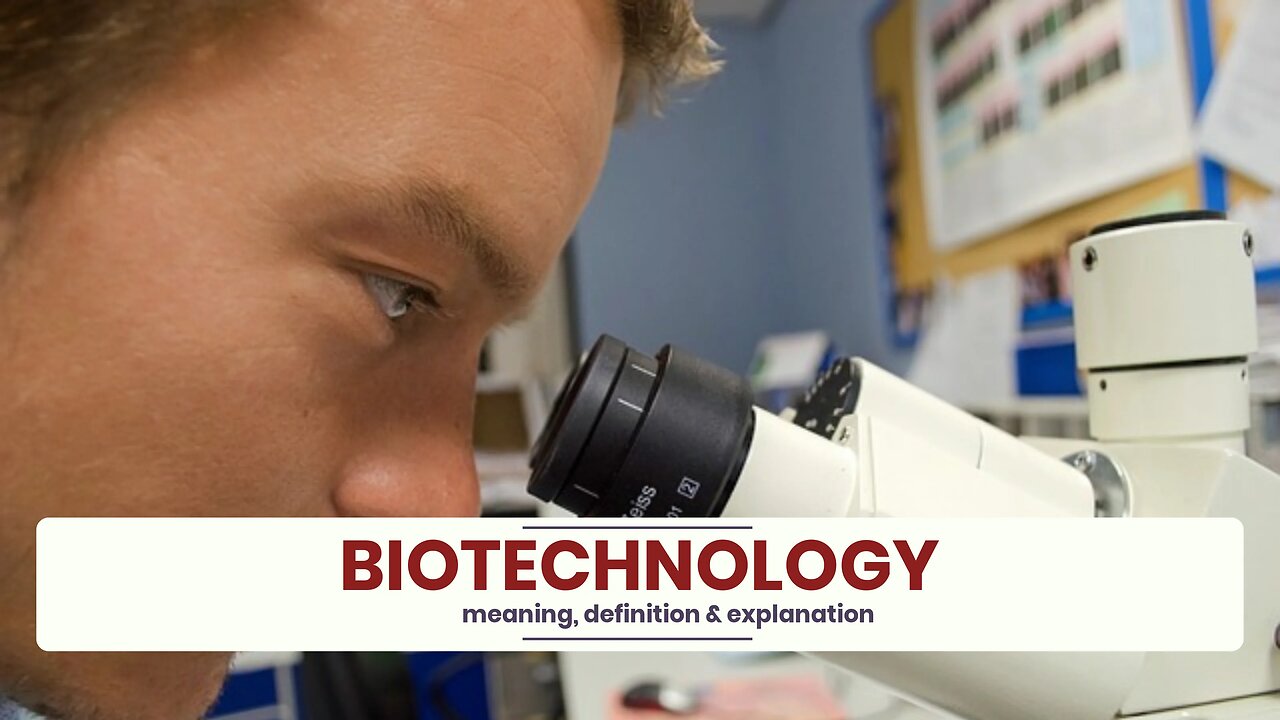Premium Only Content

What is BIOTECHNOLOGY?
✪✪✪✪✪
http://www.theaudiopedia.com
✪✪✪✪✪
What does BIOTECHNOLOGY mean? BIOTECHNOLOGY meaning - BIOTECHNOLOGY definition - BIOTECHNOLOGY explanation. What is the meaning of BIOTECHNOLOGY? What is the definition of BIOTECHNOLOGY? What does BIOTECHNOLOGY stand for? What is BIOTECHNOLOGY meaning? What is BIOTECHNOLOGY definition?
Biotechnology is the use of living systems and organisms to develop or make products, or "any technological application that uses biological systems, living organisms or derivatives thereof, to make or modify products or processes for specific use" (UN Convention on Biological Diversity, Art. 2). Depending on the tools and applications, it often overlaps with the (related) fields of bioengineering, biomedical engineering, biomanufacturing, etc.
For thousands of years, humankind has used biotechnology in agriculture, food production, and medicine. The term is largely believed to have been coined in 1919 by Hungarian engineer Károly Ereky. In the late 20th and early 21st century, biotechnology has expanded to include new and diverse sciences such as genomics, recombinant gene techniques, applied immunology, and development of pharmaceutical therapies and diagnostic tests.
The wide concept of "biotech" or "biotechnology" encompasses a wide range of procedures for modifying living organisms according to human purposes, going back to domestication of animals, cultivation of the plants, and "improvements" to these through breeding programs that employ artificial selection and hybridization. Modern usage also includes genetic engineering as well as cell and tissue culture technologies. The American Chemical Society defines biotechnology as the application of biological organisms, systems, or processes by various industries to learning about the science of life and the improvement of the value of materials and organisms such as pharmaceuticals, crops, and livestock. As per European Federation of Biotechnology, Biotechnology is the integration of natural science and organisms, cells, parts thereof, and molecular analogues for products and services. Biotechnology also writes on the pure biological sciences (animal cell culture, biochemistry, cell biology, embryology, genetics, microbiology, and molecular biology). In many instances, it is also dependent on knowledge and methods from outside the sphere of biology including:
bioinformatics, a new brand of computer science
bioprocess engineering
biorobotics
chemical engineering
Conversely, modern biological sciences (including even concepts such as molecular ecology) are intimately entwined and heavily dependent on the methods developed through biotechnology and what is commonly thought of as the life sciences industry. Biotechnology is the research and development in the laboratory using bioinformatics for exploration, extraction, exploitation and production from any living organisms and any source of biomass by means of biochemical engineering where high value-added products could be planned (reproduced by biosynthesis, for example), forecasted, formulated, developed, manufactured and marketed for the purpose of sustainable operations (for the return from bottomless initial investment on R & D) and gaining durable patents rights (for exclusives rights for sales, and prior to this to receive national and international approval from the results on animal experiment and human experiment, especially on the pharmaceutical branch of biotechnology to prevent any undetected side-effects or safety concerns by using the products).
By contrast, bioengineering is generally thought of as a related field that more heavily emphasizes higher systems approaches (not necessarily the altering or using of biological materials directly) for interfacing with and utilizing living things. Bioengineering is the application of the principles of engineering and natural sciences to tissues, cells and molecules. This can be considered as the use of knowledge from working with and manipulating biology to achieve a result that can improve functions in plants and animals. Relatedly, biomedical engineering is an overlapping field that often draws upon and applies biotechnology (by various definitions), especially in certain sub-fields of biomedical and/or chemical engineering such as tissue engineering, biopharmaceutical engineering, and genetic engineering.
-
 1:41
1:41
The Audiopedia
1 year agoWhat is PUBLIC DEBT?
53 -
 1:02:24
1:02:24
Man in America
7 hours agoThe Final Battle: Nanotech, Transhumanism & the War for Your Soul w/ Dr. Ed Group
20.4K1 -
 39:56
39:56
Sarah Westall
1 hour agoUpcoming World Wide Economic Collapse/Deep Recession & What the Big Money is Doing w/ Ed Dowd
6.76K3 -

Barry Cunningham
2 hours agoIT'S MOVIE NIGHT WITH BARRY!
23.6K11 -
 31:05
31:05
The Why Files
2 days agoPeru's Most Terrifying Mystery | The Face Peelers
29.9K41 -
 1:32
1:32
Gaming on Rumble
10 hours agoWhat is the Rumble Creator Program?!?! | Lvl UP
21.9K4 -

Flyover Conservatives
22 hours ago9/11 on Steroids: What’s Coming This Fall? - Bo Polny | FOC Show
28.8K1 -
 1:01:28
1:01:28
Precision Rifle Network
8 hours agoS4E27 Guns & Grub - Let's Talk About Gas Guns
15K1 -
 59:29
59:29
The Charlie Kirk Show
4 hours agoTHOUGHTCRIME Ep. 96 — The Great Flag Burning Debate
42.1K33 -
 57:56
57:56
The Mel K Show
3 hours agoMel K & General Mike Flynn | Betrayal of a Nation: Soros’ NATO World Order | 8-28-25
26.3K24